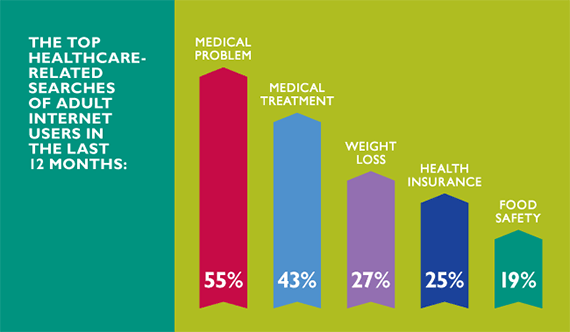Socializing medicine
Attracting e-Patients with social media marketing
Armed with smart phones, tablets and home computers, today’s patients are taking a more proactive approach to their healthcare by researching care decisions online, rather than relying solely on advice from their physicians. They are turning to their social networks and email for a more convenient and robust approach to their care; one that allows them access to care givers and information through mediums they use everyday.
In this issue of Protocol, we’ll review the “socialization of medicine;” how physicians and hospitals can leverage health information websites, online physician reviews and social media channels to keep up with their patients’ needs.
The rising tide of e-Patients
According to Nicola Ziady in “The Truth Between Patients and E-Patients,” e-Patients “are health consumers who use the web to find information about certain medical conditions. These savvy surfers also use electronic communication to source information for family, friends and their own ailments.”
Characterized by words such as equipped, enabled, empowered and engaged, e-Patients take a more active role in their healthcare by seeking out health information on their own and working together with their doctors to choose the best treatments and care. Regular patients tend to rely solely on their doctors for information, diagnoses, and treatment plans.
(Learn more in “Understanding Healthcare Consumers”)
According to a national survey conducted by the Pew Research Center’s Internet & American Life Project, 72% of internet users looked for health information online including searches on serious conditions, general information, and minor health problems. Of this group of people, 77% started their search with a search engine such as Google, Bing, or Yahoo, 13% started their search at a site that specializes in health information such as WebMD, 2% said they started their search on a general site such as Wikipedia, and 1% said they started their search on a social network, such as Facebook.
The top five healthcare related searches of adult internet users in the last 12 months were for information about: a specific disease or medical problem (55%), a certain medical treatment or procedure (43%), how to lose weight or how to control your weight (27%), health insurance, including private insurance, Medicare or Medicaid (25%), and food safety or recalls (19%). Other common searches were for: drug safety or recalls, a drug that the person saw advertised, medical test results, caring for an aging relative or friend, pregnancy and childbirth, and how to reduce your health care costs.

This study also found that the people most likely to search for health information online to figure out a possible diagnosis are: women, younger people, white adults, those with a household income of $75,000 or more, and those with a college or graduate degree.
For more on attracting ePatients to your practice, download the white paper “The Socialization of Medicine.”

